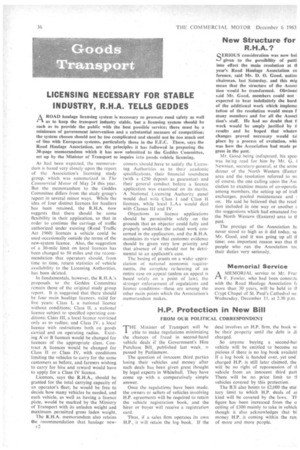LICENSING NECESSARY FOR STABLE INDUSTRY, R.H.A. TELLS GEDDES
Page 38

If you've noticed an error in this article please click here to report it so we can fix it.
AROAD haulage licensing system is necessary to promote road safety as well as to keep the transport industry stable, but a licensing system should be such as to provide the public with the best possible service; there must be a minimum of government intervention and a substantial measure of competition: the system chosen should not be too complicated and should not be too much out of line with European systems, particularly those in the E.E.C. These, says the Road Haulage Association, arc the principles it has followed in preparing the 30-page memorandum which it has now submitted to the Geddes Committee, set up by the Minister of Transport to inquire ir:to goods vehicle licensing.
As had been expected, the memorandum is based very closely upon the report of the Association's licensing study group, which was summarized in The Commercial Motor of May 24 this year. But the memorandum to the Geddes Committee differs from the study group's report in several minor ways. While the idea of four distinct licences for hauliers has been retained, the R.H.A. now suggests that there should be some flexibility in their application, so that in order to continue the carriage of traffic authorized under existing (Road Traffic Act 1960) licences a vehicle could be used occasionally outside the terms of the new-system licence. Also, the suggestion of a 30-mile limit on local licences has been changed to 50 miles and the recommendation that . operators should, from time to time, return statistics of vehicle availability to the Licensing Authorities, has been de:eted.
In fundamentals, however, the R.H.A.'s proposals to the Geddes Committee remain those of the original study group report. It is suggested that there should be four main haulage licences, valid for five years: Class 1, a national licence without conditions; Class II, a national licence subject to specified operating conditions; Class III, a local licence restricted only as to radius; and Class IV, a local licence with restrictions both on goods carried and on operating radius. Existing Aor B licenceS would be changed for licences of the appropriate class, Contract A licences would he changed for Class II or Class IV, with conditions limiting the vehicles to carry for the same customers as before, and farmers wishing to carry for hire and reward would have to apply for a Class IV licence.
Licences, says the R.11.A., should be granted for the total carrying capacity of an operator's fleet; he would be free to decide how many vehicles he needed, and each vehicle, as well as having a licence plate, would be marked by the Ministry of Transport with its unladen weight and maximum permitted gross laden weight.
The R.H,A. memorandum also retains the recommendation that haulage new
comers should have to satisfy the Licensing Authorities as to their academic qualifications, their financial soundness (with a £250 deposit as guarantee) and their general conduct before .a licence application was examined on its merits. A National Licensing Authority panel would deal with Class I and Class II licences, while local L.A.s would deal with Classes Ill and IV.
Objections to licence applications should be permissible solely on the grounds that an objector could fully and properly undertake the actual work concerned in the application, and the R.H.A. maintains its view. that customer, evidence should be given very low priority and that absence of it should not be detrimental to an applicant's case.
The basing of grants on a wider appreciation of national economic requirements, the complete re-hearing of an entire case on appeal (unless an appeal is based solely on a point of law), the stronger enforcement of regulations and licence conditions—these are among the other main points which the Association's memorandum makes.




























































































































